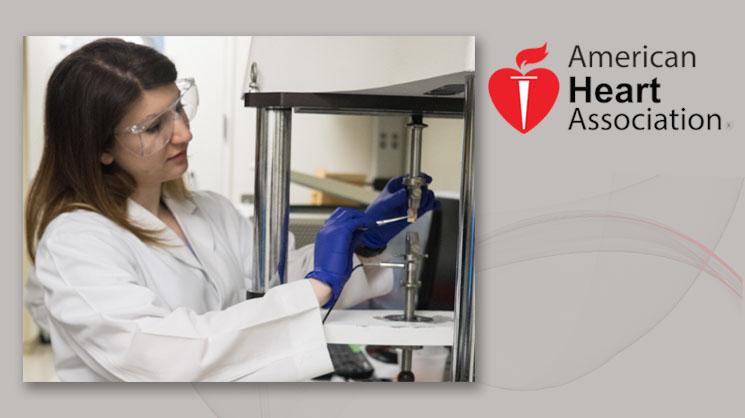Lab-grown tissue engineered shield to protect against calcific valve disease
Rice University bioengineering graduate student Madeleine Gomel has been awarded a competitive predoctoral fellowship by the American Heart Association (AHA) to engineer an endothelial cell lining to protect against heart valve calcification.
This fall, Gomel will begin her fourth year of graduate research studies in Professor Jane Grande-Allen’s Integrative Matrix Mechanics Laboratory. The AHA fellowship will provide up to $53,688 of generous support.
Current treatments for late-stage valve failure require a full replacement with either a mechanical valve or a bioprosthetic valve made from tissue transplanted from animal donors’ valves. Gomel says biologic valves do not require patients to take a regimen of anticoagulation medication, but more research is needed to improve the lifespan of the valves.
“Valve calcification is the leading cause of biologic valve failure. One of the most cited causes for calcification has been linked to the use of glutaraldehyde, an antimicrobial fixative used during valve replacement to reduce risk for immunological rejection,” said Gomel.
Over a 10 to 15-year timeframe, or less for young patients with more robust immune systems, glutaraldehyde fixation, immune rejection, and inflammation have been found to play a role in the formation of calcium nodules within aortic cusps.
Gomel’s research aims to reduce valve calcification and failure by using a durable patent-pending protective coating that chemically bonds a thin hydrogel layer on the grafted valve tissue and promotes new endothelial growth.
“This endothelial layer, which is grown from the patient’s own cells, acts like a shield as it protects the valve from rejection by the recipient’s immune system and from calcification with the passage of time,” Gomel said.
Research in the Grande-Allen laboratory involves mechanical testing, biochemical measurements, and microstructural analysis of critical components found in the extracellular matrix (ECM) that makes up cardiac tissue. To relate tissue composition and mechanics the lab specializes in the development and use of bioreactors that mimic the physiological conditions of repeat opening and closing of the valve. Gomel’s bioreactor will test the coated valves and compare them to normal tissue valves to assess the change in lifespan and durability.
Gomel added, “As medicine improves, patients with valve implants are living longer. Through this project I hope to elongate the lifespan of tissue valves, thus eliminating costs and risk associated with repeat open-heart replacement valve surgeries, and improving the quality of people’s lives.”

